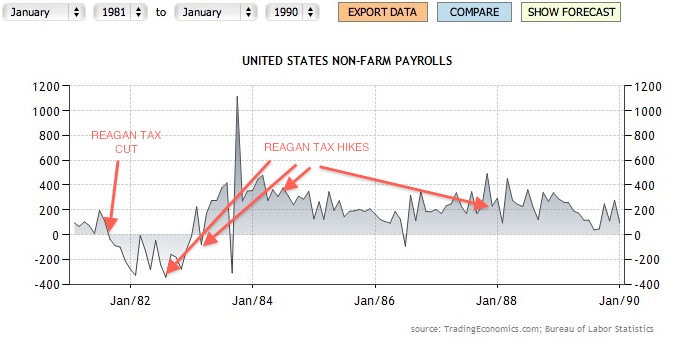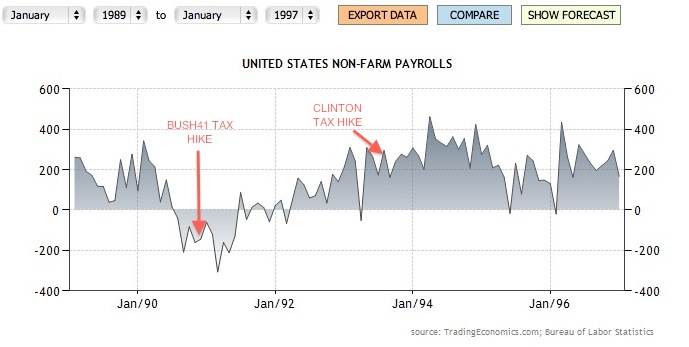Yesterday I looked at the Republicans' claim that tax hikes hinder economic growth, and tax cuts stimulate it. By looking at the actual data, it's clear that any correlation or causation is spurious at best.
Today we'll look at another Republican talking point in the debate over the federal budget: that tax cuts destroy jobs and tax cuts create jobs.
Let's go to the charts:

As you can see, after Ronald Reagan cut taxes in 1981, US non-farm (farms are highly volatile, due to the seasonality of agriculture, and so are excluded when looking at employment trends) payrolls fell every month for about the next year and a half.
After he raised taxes -- in 1982, 1983, and 1987 -- job growth was mostly positive. It's true that employment is a lagging indicator, meaning it picks up after companies are already earning more, so it could be argued that the 1981 tax increase was responsible for the job growth in late 1983 and beyond.
But if you want to argue that, you'd also have to accept that tax increases also resulted in job growth. Take a look at the record of Bush41 and Clinton:

Job losses slowed, and job gains hastened, following tax increases. There were also periods of slack growth and loss, so it's tough to argue for causality in either direction. It's possible that, with other policies and factors external to government action, the increases or decreases in taxes were a factor, but from Republican claims you'd think there'd be a sharp drop after each of the arrows in this chart.
I'm not going to make another chart for Bush43; his appalling record should be fresh enough in our memories that we don't need to look to know that the 2001 and 2003 tax cuts he enacted, which Republicans specifically claimed were intended to motivate hiring -- the 2003 tax cut was titled "The Jobs and Growth Tax Relief and Reconciliation Act" -- did no such thing.
Moreover, Bush43's tax cuts were targeted toward the wealthy, the excuse being that it's rich people who do the hiring (which doesn't quite mesh with claims that small businesses create 2/3 of the jobs, since small business owners' income is their companies' profit, not revenue -- but never mind).
What's the effect of tax cuts for the rich on job creation? The Congressional Budget Office says little to none.
What would help boost the economy? CBO Director Doug Elmendorf says, "A temporary increase in aid to the unemployed would have the largest effect on the economy per dollar of budgetary cost."